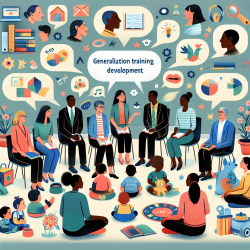Understanding Stigma in Health Contexts
Stigma is a pervasive issue affecting health outcomes across various conditions, particularly in low- and middle-income countries (LMICs). According to a comprehensive scoping review by Kane et al. (2019), stigma associated with high-burden diseases like HIV, tuberculosis, mental health disorders, epilepsy, and substance use disorders has been shown to adversely impact health outcomes, including treatment adherence and help-seeking behaviors. The review highlights the fragmented nature of stigma research and the need for comprehensive, interdisciplinary approaches to mitigate stigma's impact on health.
Implications for Speech Language Pathologists
As speech language pathologists (SLPs), understanding the implications of stigma is crucial, especially when working with children who may face stigma due to speech and language disorders. The findings from Kane et al. (2019) provide valuable insights into how stigma can affect health outcomes and the importance of addressing stigma in therapeutic settings.
Key Findings from the Review
- Stigma and Health Outcomes: Stigma is linked to poor health outcomes, including decreased treatment adherence and reduced help-seeking behaviors.
- Methodological Gaps: The review identifies a lack of longitudinal studies and non-representative samples, which limits the generalizability of findings.
- Need for Interdisciplinary Approaches: Effective stigma mitigation requires transdisciplinary studies to understand the complex interactions between stigma and health outcomes.
Strategies for SLPs to Mitigate Stigma
SLPs can play a pivotal role in mitigating stigma by incorporating the following strategies into their practice:
- Education and Awareness: Educate families, educators, and communities about speech and language disorders to reduce misconceptions and stigma.
- Advocacy: Advocate for policies and practices that promote inclusivity and reduce stigma in educational and healthcare settings.
- Support Networks: Facilitate support groups for children and families to share experiences and strategies for coping with stigma.
- Collaborative Approaches: Work with interdisciplinary teams to address the broader social determinants of health that contribute to stigma.
Encouraging Further Research
While the review by Kane et al. (2019) provides a comprehensive overview of stigma's impact on health, there is a need for further research specifically focused on speech and language disorders. SLPs are encouraged to engage in research that explores the unique aspects of stigma in this field and to develop evidence-based interventions that can be implemented in diverse settings.
By leveraging the findings from this review and integrating them into practice, SLPs can contribute to reducing stigma and improving health outcomes for children with speech and language disorders. To read the original research paper, please follow this link: A scoping review of health-related stigma outcomes for high-burden diseases in low- and middle-income countries.










